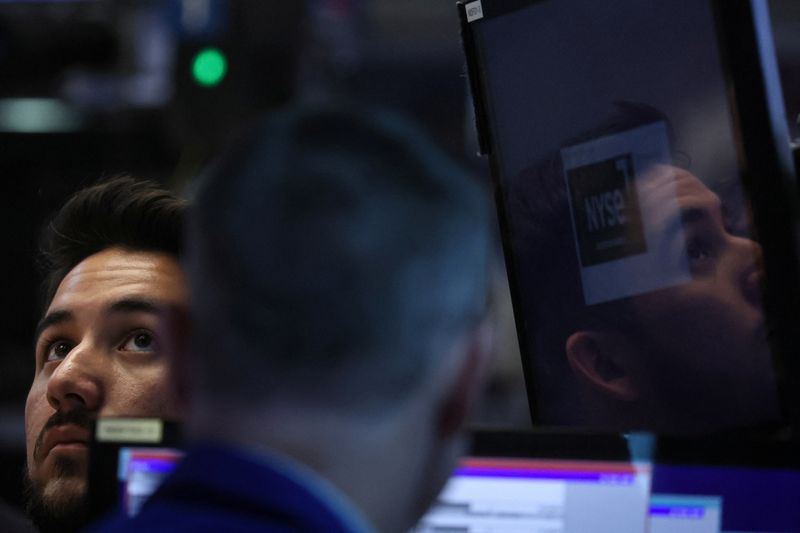Investing.com -- U.S. futures tread water as markets gear up for much-anticipated earnings from Nvidia (NASDAQ:NVDA) this week and assess fresh interest rate commentary from Federal Reserve policymakers. Shares in Palo Alto Networks slip in extended hours trading after the cybersecurity group's fourth-quarter billings forecast fails to impress analysts. Samsung Electronics (KS:005930) shakes up the leadership of its semiconductor division in a bid to keep pace in the race to roll out AI-specialized chips.
1. Futures tread water
U.S. futures hovered around the flatline on Tuesday, as investors looked ahead to quarterly earnings from artificial intelligence poster child Nvidia later this week and gauge interest rate commentary from Federal Reserve officials.
By 03:30 ET (07:30 GMT), the Dow futures contract was mostly unchanged, S&P 500 futures had inched higher by 3 points or 0.1%, and Nasdaq 100 futures had edged down by 9 points or 0.1%.
The Nasdaq Composite was the stand-out performer in the prior session, with the tech-heavy index closing at an all-time record high thanks to bubbling enthusiasm over the upcoming results from Nvidia. Markets are keen to see if the semiconductor group, whose chips have made it a focal point of booming interest in the possible applications of AI, will deliver yet another quarter of massive growth despite increasing competition.
Commentary from several Fed policymakers, meanwhile, indicated that the central bank still wants to see more evidence that inflation is sustainably cooling to its 2% target before rolling out any possible interest rate reductions this year. But the statements did little to persuade traders to recalculate wagers that the Fed will unveil a cut as soon as September.
2. Palo Alto Networks posts disappointing billings forecast
Shares in Palo Alto Networks (NASDAQ:PANW) slipped in extended hours trading after the group's outlook for fourth-quarter billings received a tepid response from some analysts.
Like other cybersecurity firms, Palo Alto has been facing weakness in spending by clients concerned by an uncertain economic environment. Customers, wary of the possible risks posed by placing all of their digital security needs in the hands of one company after a recent spate of high-profile breaches, are also investing in multiple vendors.
In a call with analysts, Chief Executive Nikesh Arora noted that Palo Alto's ongoing attempt to consolidate its users on to one centralized platform has enjoyed "initial traction." However, he said this strategy has driven an increase in bookings with deferred payments and impacted billings, adding that this trend is "something we expect will continue."
Palo Alto estimates that fourth-quarter billings will be between $3.43 billion and $3.48 billion, roughly in line with estimates at the midpoint. But analysts cited by Reuters called the guidance "lackluster."
Elsewhere on the earnings front on Tuesday, DIY-retailer Lowe's Companies (NYSE:LOW) and aftermarket auto parts seller AutoZone (NYSE:AZO) are due to report prior to the opening bell on Wall Street.
3. More Fed speak ahead
Federal Reserve Governor Christopher Waller is set to be latest official from the central bank to deliver public comments this week, with markets on the lookout for any clues about the path ahead for interest rates.
Waller will speak on the outlook for the U.S. economy, according to the Fed's events calendar.
Several of his colleagues sounded a mostly cautious note on Monday, saying that they have yet to see sufficient evidence that a cooldown in U.S. inflation will be long-lasting. As a result, they largely suggested that rates will need to stay at their currently elevated level of 5.25% to 5.5% until there is more proof that price pressures are abating.
The Fed's next policy meeting is slated for June 11-12. Traders are widely betting that officials will leave rates unchanged at the gathering.
4. Samsung Electronics taps new head for chip unit
Samsung Electronics has named a new head of its semiconductor division, as the South Korean manufacturer looks to keep pace with its rivals in the ongoing race to develop AI-optimized chips.
Memory chip veteran Young Hyun Jun has been appointed to helm the unit, replacing Kyehyun Kyung, Samsung said on Tuesday. The company argued that the shake-up will strengthen the segment's competitiveness "amid an uncertain global business environment."
The move comes as analysts are flagging that Samsung is trailing peer SK Hynix in the intensifying push to develop the high bandwidth memory (HBM) chips used in artificial intelligence.
Samsung, which is targeting a tripling of its HBM supply this year, has already begun mass production of its HBM3E chips, according to the Financial Times.
5. Oil dips
Crude prices fell Tuesday, extending losses posted in the previous session, on worries high U.S. interest rates will hit economic activity in the world’s largest consumer this year.
By 03:31 ET, the U.S. crude futures (WTI) traded 0.7% lower at $78.78 per barrel, while the Brent contract dropped 0.7% to $83.14 a barrel.
Both benchmarks fell less than 1% on Monday as U.S. Federal Reserve officials said they were awaiting more signs of slowing inflation before considering interest rate cuts.
Political uncertainty in Iran, following the death of Iranian President Ebrahim Raisi, as well as concerns over the Saudi King’s health have also presented some risk for the crude markets.
